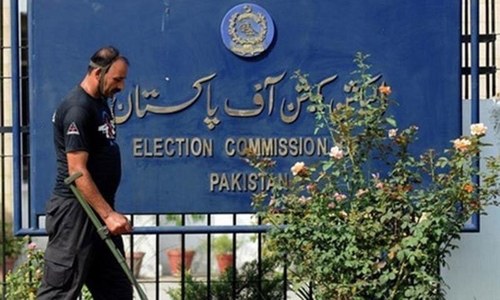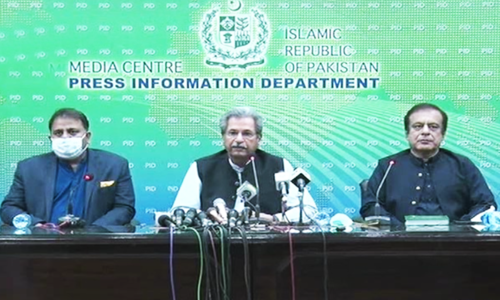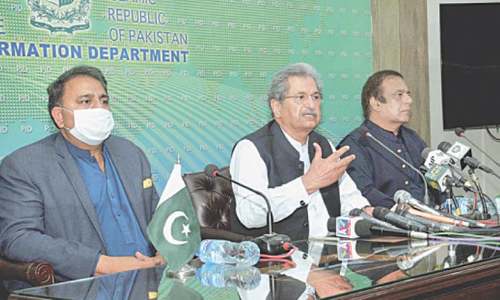• Minister says commission not serving its purpose
• PM wants briefing on electronic voting process every week
• Interior ministry asked to introduce arms licensing policy
ISLAMABAD: The government on Tuesday announced that it would move the court to initiate contempt proceedings against the Chief Election Commissioner (CEC) and members of the Election Commission of Pakistan (ECP) if they did not resign from their offices.
“We are working with the Attorney General of Pakistan and if the ECP (members) does not resign, we will go for contempt of court proceedings against them,” Minister for Science and Technology Fawad Chaudhry said at a joint press conference with Minister for Industries Hammad Azhar.
“We believe that the ECP (CEC and members) should go itself, otherwise we have legal options,” the minister said.
Being a political party, the Pakistan Tehreek-i-Insaf (PTI) had only conveyed people’s demand to the ECP high-ups to tender resignations and gave an opportunity to the parliament to form a new commission, he said.
“The current commission is not serving the purpose for which it was created,” he said, adding that the ECP could only be credible if all political parties had faith in it.
“A disputed ECP cannot take matters forward,” he said.
The government believed that the ECP had not followed the orders of the Supreme Court to hold the recent Senate elections through the use of technology to curtail chances of rigging and ‘horse trading’.
The minister said Article 218 (3) of the Constitution clearly stated that the ECP was responsible to hold free, fair and transparent elections with no corrupt practices.
All political parties had a consensus that the ECP had failed to fulfill its responsibilities, he added.
The Supreme Court, he said, had advised the ECP to utilise technology to ensure transparent elections, with no corrupt practices, but it failed to do so.
Referring to the videos of ‘horse trading’ and ‘vote buying’ that surfaced before the Senate elections, the minister said even a common man knew very well whether the polls were transparent or not.
Earlier, addressing the cabinet meeting, Prime Minister Imran Khan said the use of Electronic Voting Machines (EVMs) was imperative to ensure fair and transparent elections.
“From now on I will get briefing, especially on EVM, and voting of overseas Pakistanis in every cabinet meeting,” he said.
Mr Chaudhry said at the very start of the cabinet meeting the prime minister highlighted the issue of transparency in the electoral system. “PTI had two important points in its manifesto, which included accountability and transparency in elections,” he added.
The prime minister directed that electronic voting system be introduced and the cabinet be apprised of the process of introducing the voting machines every week.
He said there were some political forces which would always dispute the election process but the government wanted to ensure transparency for the satisfaction of the general public.
Replying to a query, Mr Chaudhry termed the Pakistan Democratic Movement (PDM) a group of “political orphans”. It was ironic that Mahmood Khan Achakzai, Aftab Sherpao and others, whose parties did not have members in the national and provincial legislatures and had no stake or role in the system, were demanding resignations from assemblies, he said.
“The Pakistan Muslim League-Nawaz and the Pakistan Peoples Party, being the major parties in the PDM, would hopefully not favour such a rash demand as they knew the consequences. If they agreed to do so, it would be important to see how many legislators followed their decision,” he added.
He said the prime minister also directed the interior ministry to introduce a comprehensive arms licensing policy in the country. “I hope it will be announced in a week’s time,” the minister added.
He said Prime Minister Khan was personally monitoring prices of daily-use commodities and all possible steps were being taken to provide relief to the common man.
He said when the PTI came to power, the economy was in a shambles but the government took all possible steps to protect the poor from the effects of inflation and price hike.
“There is good news: the Utility Stores Corporation, which was ruined during the previous governments, would come out of loss by the end of the year,” he added.
The minister said the cabinet expressed its concern over the increasing Covid-19 cases and expressed the hope that Pakistan would also handle the third phase the way it had handled the first two phases.
He said the pandemic had played havoc with the healthcare systems and economies of many developed countries, but Pakistan, due to timely action and effective policies, was successful in saving lives and livelihood of the people.
The minister said the cabinet gave approval to the proposal of appointing Raja Mazhar as the managing director of the National Book Foundation.
He said the cabinet also gave a go-ahead to end ban on issuance of prohibited and non-prohibited bore arms licences by approving a comprehensive licence policy.
He said the cabinet also discussed the issue of improper use of petroleum companies’ CSR. Now rules have been changed and the petroleum minister had been authorised to monitor the entire process of CSR utilisation.
He said the cabinet gave approval to the proposal of issuing smart cards to registered Afghan refugees, adding that the decision was part of the prime minister’s policy of providing relief to the poor people.
The cabinet was informed that 400,000 new gas connections had so far been given against the target of 600,000 set for the current fiscal year. Next year the target would be 1.2 million new gas connections.
The cabinet, he said, was also briefed on structural reforms and it was decided that in future latest audit paragraphs would come up before the Public Accounts Committee to promote timely process of parliamentary supervision and accountability.
The minister said tax exemption was granted on auto-disable syringes to prevent spread of various diseases.
Responding to a question, Mr Chaudhry said there were 66 oil marketing companies in the country but only eight firms were supplying around 92pc of the oil.
He deplored that national institutions like PIA, Pakistan Television and petroleum-sector departments were ruined during tenures of the previous governments.
Published in Dawn, March 17th, 2021














































